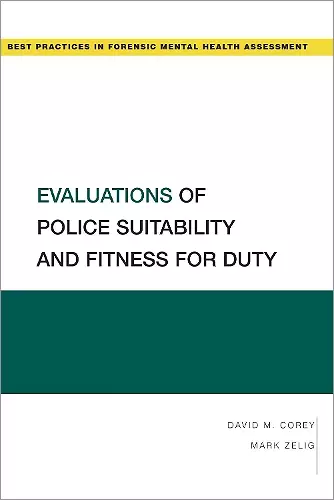Evaluations of Police Suitability and Fitness for Duty
David M Corey author Mark Zelig author
Format:Paperback
Publisher:Oxford University Press Inc
Published:5th Jun '20
Currently unavailable, and unfortunately no date known when it will be back

Forensic mental health assessment (FMHA) has grown into a specialization informed by research and professional guidelines. This series presents up-to-date information on the most important and frequently conducted forms of FMHA. The 20 topical volumes address best approaches to practice for particular types of evaluation in the criminal, civil and juvenile/family areas. Each volume contains a thorough discussion of the relevant legal and psychological concepts, followed by a step-by-step description of the assessment process from preparing for the evaluation to writing the report and testifying in court. Volumes include the following helpful features: - Boxes that zero in on important information for use in evaluations - Tips for best practice and cautions against common pitfalls - Highlighting of relevant case law and statutes - Separate list of assessment tools for easy reference - Helpful glossary of key terms for the particular topic In making recommendations for best practice, authors consider empirical support, legal relevance, and consistency with ethical and professional standards. These volumes offer invaluable guidance for anyone involved in conducting or using forensic evaluations. A majority of police departments across the country conduct psychological evaluations of their police applicants and many also conduct periodic evaluations of incumbent police officers. With a small percentage of psychologists conducting these evaluations, and an even smaller number who have passed through board certification in forensic psychology or police and public safety psychology, there is a pressing need for education and training resources for practitioners seeking to develop competency in this area of practice. Evaluations of Police Suitability and Fitness for Duty, fills a gap in the literature, and explains the legal, procedural, ethical, and clinical foundations for these types of evaluations untethered to any single assessment instrument. Throughout the text, authors David M. Corey and Mark Zelig distinguish between enforceable, standards-based requirements and aspirational best practices. The book starts with a review of the most prominent federal laws and regulations, professional practice guidelines, and ethical standards pertinent to these evaluations. From there, applied chapters provide detailed procedural guidance, including advice for obtaining informed consent, providing disclosure to the involved parties, conducting clinical and collateral interviews, selecting written assessment instruments, integrating assessment findings to reach determinations of suitability and fitness, and preparing written reports and testimony for various audiences and uses.
This book joins an incredibly useful collection of volumes in the series. In terms of mental health assessment, "best practices" are often in the eye of the beholder. That is why it is so important that best practices as outlined in this series, and in the current volume in particular, should be well informed and pragmatic... Only recently have efforts been made to standardize such assessments, to link those assessments to the field of mental health, and to consider them during hiring, training, and after critical incidents. Many useful concepts and procedures are discussed, including functional competencies and how to describe and evaluate them, as well as common pitfalls of data interpretation. The material on explicit and implicit bias is crucial to consider in terms of both the assessor and the one being assessed. This all-around practical guide will not only facilitate the conduct of such assessments but also explain to agencies why they are needed. * Choice *
ISBN: 9780190873158
Dimensions: 137mm x 208mm x 20mm
Weight: 340g
296 pages